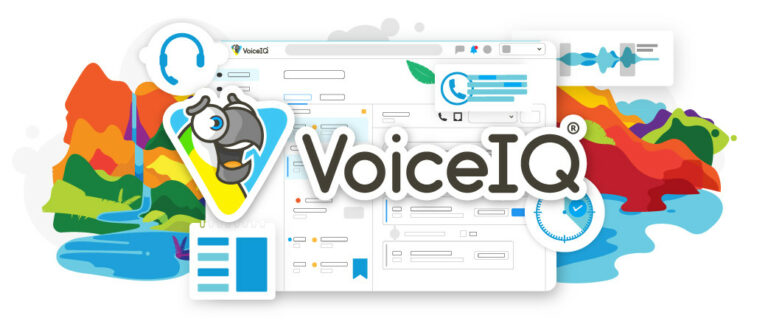We spoke to Sam to find out how it works.
Why did you start VoiceIQ?
VoiceIQ was primarily started out of frustration at the lack of features and use of AI in existing enterprise phone systems. Current voice platforms are systems that have been around for the past few decades and not much has changed since their first conception.
They are purely telecoms platforms and were never designed to do anything but telecoms. To layer the type of sophistication VoiceIQ has on top, is actually a very complex issue. For the most part, incumbent telephony systems are happy to stick with what they know and make money without any thought for innovation and changing customer expectations.
This places VoiceIQ in a very unique position as we can start with a complete clean sheet.
Our platform isn’t necessarily built for telecommunications (which has been done to death). It’s a platform which leverages all the data that comes about as a consequence of voice and telephony in general. We wanted to create a system that offers real value to companies.
We deliver this value in our AI based algorithmic work – predictive call scheduling, automatic topic detection and automated next best actions. Current telecoms companies don’t really understand how to do this right now and they have a massive skillet missing from their ‘DNA’ – a skillet which is embedded into VoiceIQ.
Tell us more about the tech behind the product?
The VoiceIQ platform is a web application designed to replace the whole telephony set up in a company. We deploy a variety of machine learning, natural language processing (NLP) and automation technologies to make the entire process of making and receiving calls more efficient which ultimately results in more call connects, increased call success and more revenue.
The machine learning technology is used in VoiceIQ’s predictive call scheduling algorithm, which uses past call history to suggest the best time to call a contact. This is used to update an agent’s call plan so that they are calling contacts at a time when they’re most likely to answer. More call connects equal more sales. Additionally, other rules can be applied to the scheduling algorithm including matching agents and contacts based on personality type, previous interactions or domain expertise.
We also apply NLP technology to detect key elements of conversation and automatically initiate subsequent workflow actions. For example, VoiceIQ can detect buying signs during a phone call and automatically create an opportunity in the company’s CRM system. Combined with real time translation and automatic call logging, this essentially reduces agent’s post-call admin time to zero, giving them more time to do what they do best.
Sentiment and emotion analysis is carried out on all conversations which is used to inform users as to how customers are really feeling. With this information they can adapt the communication to suit the emotion and sentiment of their customer.
Where are you at right now?
Having started as a team of three just over a year ago, we have now grown to a team of 30. We currently have our headquarters located in Manchester where all sales, marketing, operational and AI development work takes place. We also have a development team located in Sri Lanka.
VoiceIQ has so far raised £2.5 million and a significant proportion of this investment has gone into product development. We are now pivoting to sales and marketing efforts and have already successfully onboarded some of the worlds largest financial services companies as customers.
What are your aims for the next year?
Over the coming year, we will be investing heavily into sales and marketing operations. This will include hiring additional sales personnel and initiating digital marketing campaigns to increase inbound lead generation. Additionally we will be partnering with resellers around the UK and the US to rapidly expand our operations and gain first mover advantage in the new domain of AI powered enterprise communication.
We will also be partnering with the University of Manchester to enhance our AI capabilities, specifically in the application of NLP to automatically detect and flag signs of vulnerability during a phone conversation. This is a game-changing feature that financial services companies will ultimately be obliged to utilise to protect consumers from financial misselling.
What’s been the hardest thing about getting VoiceIQ off the ground?
While we have built some incredibly sophisticated technologies and algorithms, we have had the in-house capabilities to match the complexity. Our tech team is lead by an incredibly experienced CTO, and a Professor from the University of Oxford as Chief Scientist.
The hardest thing about getting VoiceIQ off the ground is the sales cycle length. We initially targeted large enterprise customers, and although we had success in securing POCs in several, it took over six months in some cases. As a startup, this lengthy sales cycle is not ideal and we have now pivoted to smaller sized businesses with a sales cycle of under a month.
Why should more people be using VoiceIQ?
With the time efficiency savings VoiceIQ provides, every day a company is not using VoiceIQ, they’re wasting agents time, missing sales opportunities, running campaigns with no meaningful insights and not resolving customer cases quickly enough. Additionally, the sooner a company starts to use VoiceIQ, the sooner they will benefit from the learning capabilities of our machine learning technology.
More broadly, VoiceIQ provides companies with truly game-changing AI technology. We’re at the point of huge change in society and business and the driver is AI.
Businesses really need to understand how it will impact them or risk becoming irrelevant in the fourth industrial revolution. Only a few years ago, companies were saying “we don’t need a website – customers can come to our stores” – these errors in judgement led to the obsolescence of many businesses.
In order to survive in the future, companies today need to better understand every interaction that they have with their customers and the best way to do that is through embracing AI technologies. VoiceIQ is the ideal platform to incorporate AI technology right at the core of a company’s operations.
How much will it cost users – and why is it worth the investment?
VoiceIQ is currently split into 3 tiers:
- Essentials edition – £15 pupm (includes basic phone system requirements and CRM integration)
- Power edition – £60 pupm (includes all AI capabilities)
- Platform edition – custom pricing (offers all VoiceIQ features as APIs to companies to make bespoke implementations)
We believe these prices hold tremendous value for customers. Our customers have typically made significant investment into their CRM system but now struggle with user adoption and often lose hours to general CRM admin.
With VoiceIQ’s seamless CRM integration, all interactions are automatically logged within the CRM and post call actions are entirely automated. Therefore, investment in VoiceIQ validates investment into the CRM and also frees up agent time to close sales and service cases.
Additionally, the cost for implementing a system from traditional telephony providers can be extremely high, not to mention the time investment for installation and maintenance. VoiceIQ in comparison is simple to install and can be done so in less than a day. Costs are billed monthly per user so that no significant up front investment is required.












